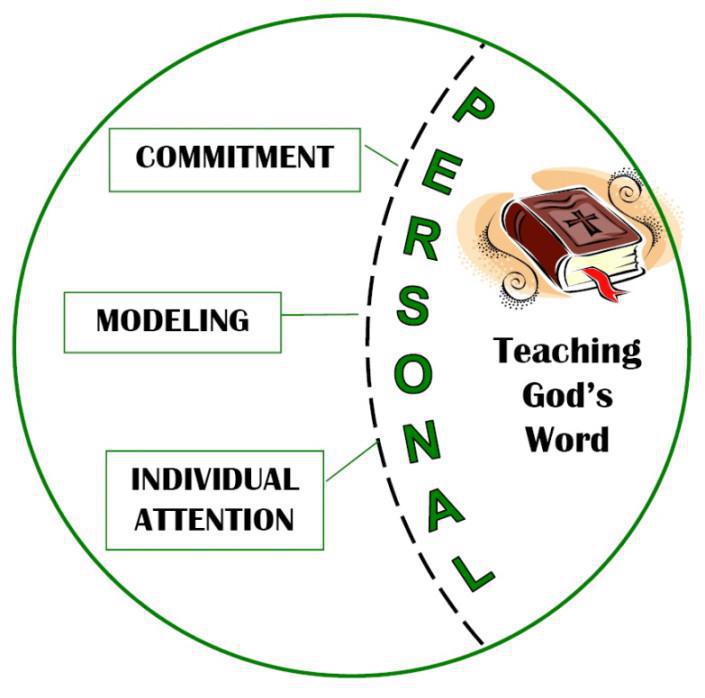The emphasis in the mentoring process is on our personal relationship with the Lord - our heart attitude - rather than behavior manipulation, (which is the erroneous way many believers live their Christian life). The focus is on allowing God to inwardly transform our thinking to His perspective and values, which will lead to Godly conduct.
For long time believers, going through the lessons will help identify gaps in their spiritual understanding and address spiritual needs in order to strengthen their relationship with the Holy Spirit and allow God to use them for His purposes, including mentoring others.
LOGISTICS
- NOTE: Normally, men should disciple men and women should disciple women, or a couple with a couple. This is because of the intimate relationship forged through this process.
- Ideally, arrange to meet about once a week for approximately 1½ hours or so. That will allow time for plenty of sharing and discussion without rushing. The time will vary depending on their spiritual hunger, assimilation of Biblical concepts and maturity level, as well as life’s demands.
- TIP: You want to meet often enough to ensure continuity and continued growth. Life DOES happen, however, so be understanding and gracious when things interrupt the schedule!
- Beginning with Phase 1, plan to spend at least 3 to 9 months with a mentee, meeting regularly. Growth takes time.
- TIP: Work through each lesson, in order. They are designed for a specific progression - to lead the mentee to make a Lordship decision and understand how to continually Abide in complete dependence on the Lord.
- Where to meet? Consider a quiet place with minimal distractions: perhaps one of your homes, a coffee shop or restaurant if it is a slow time, the church, or even a park.
GUIDELINES AND SUGGESTIONS
-
The purpose of the meetings is to explain Biblical truth and principles, and to give the mentee opportunities to ask questions, share spiritual struggles, and discuss related topics.
-
The material is structured to stimulate conversation to help encourage growing spiritually and walking in dependence on the Lord under the guidance of the Holy Spirit. The lessons are not just academic material to be studied only to acquire knowledge, although having Biblical knowledge is important.
-
Seek to convey Biblical principles to live by, not just to impart Biblical knowledge. The “spiritual parenting” model of discipleship should include commitment, modeling and individual attention in addition to teaching God’s Word. (See also the “Redefining Discipleship” section of the app located here for more on these components.)
-
My goal is to lead them into dependence on the Holy Spirit, and independence from me. I should expect the typical Christian, if correctly mentored, to become a “spiritual reproducer”.
-
Ask open-ended questions to help discover what the mentee is thinking and how God is talking to them. (practice a facilitation style of interacting.)
-
Facilitating is the art of asking questions so THEY come to the conclusion YOU want them to! This allows the Holy Spirit to work / grow / guide them. Facilitation is "learner-centered.” This is how you will identify gaps in their understanding. They don't really know what they don't know or understand, and neither do you!
(See the DTI Facilitation Guide for Mentoring and Small Groups available on our website, or follow this link.)
-
-
Always begin with prayer. Keep it simple and brief so the mentee will be comfortable praying out loud at some point as they grow.
-
Take turns reading the points and Scriptures out loud between you and the mentee and discuss the concepts together.
-
Share your own experiences and insights into how God has been working in your life, as the Holy Spirit leads you. (You are modeling for them.)
-
Be flexible enough to allow the Holy Spirit to change the direction of the study or conversation, yet orderly and intentional enough so time is not squandered on less significant matters.
-
Go through the material at the mentee’s pace. That also means not necessarily rushing to finish one lesson each session. Some lessons take longer than others, and the mentee needs time to assimilate and apply what was discussed.
-
It's not how rapidly you go through the material, but the spiritual growth that results. Growth can be slow and takes time. Sometimes, depending on what's going on in your mentee's life, you may get through only a small amount of the material -- however the Holy Spirit leads.
-
TIP: Ask the mentee to keep track of where you left off and where to begin. That shows their investment and relieves pressure on you, especially if you are mentoring more than one person.
-
TIP: Although we do not recommend requiring the mentee "to read and study for next week," we often encourage them to review the Scriptures that were just discussed and meditate on them, asking God to reveal more truth and application to their life.
-
TIP: If the mentee DOES "read ahead" and says "I have already read this on my own", we still highly recommend that you go through it with them, asking what God showed them as they read. Often, the Holy Spirit will bring out even more insights to both of you. In our experience, skipping parts or rushing because they think they have already studied a section usually indicates a focus on "checking the box" (behavior) rather than allowing God to transform them.
-
-
Encourage the mentee to look to the Lord to apply Biblical principles to their everyday life.
-
Don't allow your relationship with the mentee to dissolve into just being friends, although building a relationship with them is important. It’s easy for the sessions to become a "pity party" consumed with complaining about all of life's problems. Be intentional and continue going through the material and watch how God will use the Scriptures to speak to the mentee and their situation.
-
Always ask the mentee if they have prayed about a situation they are complaining or asking advice about. Be careful about giving opinions and advice, as you want to encourage them to ask the Lord. You might say something like “Have you thought about this_____? But you should pray and see what God says.”
-
It is important that I am a thoughtful listener. It’s the best way to identify gaps in their spiritual understanding.
-
Always end with a prayer for whatever concerns have been expressed -- and for the mentee's continued growth. Be sure to share your own personal prayer requests so they can pray for you, as well.
-
Don't be surprised when the Lord talks to YOU about things in your own life as you walk side-by-side with your mentee. That's what He does!
-
Always have a Bible (digital or paper) to help with understanding and insights from other versions, or to read an entire passage.
-
PLEASE teach your disciple to use their Bible and read the verses in context of the entire chapter and to ask the Holy Spirit for guidance as to how that passage applies to them.
-
Again, remember that growth takes time, just like in the natural world. Each person will be unique and in a different place spiritually from others. The goal is spiritual maturity-- not getting through the material quickly.
-
As the mentee grows, encourage them, as opportunities arise to clearly explain to others the Biblical principles they are learning. As the Holy Spirit leads, the mentee should start mentoring another person, with your assistance.
-
As you continue to build your relationship let the mentee know that you are available throughout the week. Perhaps periodically text them a verse that was inspirational to you.
-
Regularly monitor their spiritual growth even after your formal discipleship time is completed.
-
Regularly pray for the disciple and with the disciple.
-
Remember you are a role model for your mentee. You should tell them about your spiritual growth when appropriate, under the guidance of the Holy Spirit. They will be encouraged when they hear what God is doing in your life. They can reason, "If you trusted God and He took care of that situation, then maybe I can trust God, too."
NOTE: We have found that the nurturing aspect of one-on-one mentoring is crucial and effective in spiritual growth, just as Paul discusses in 1 Thessalonians 2:3-13. You should expect to see spiritual maturity, spiritual fruitfulness and spiritual reproduction in the mentee’s life as they grow and apply these DTI concepts and integrate them into their everyday life.
Watch this video for an overview of Lesson 2-3.



